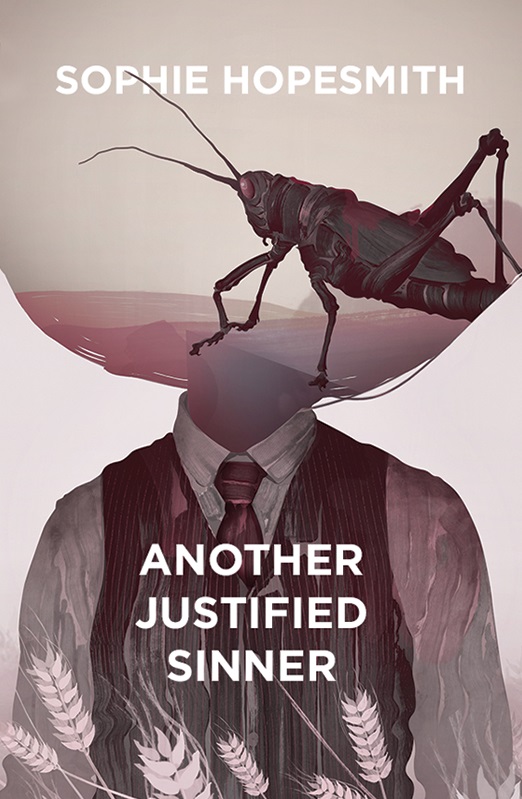You have no items in your cart. Want to get some nice things?
Go shoppingIn Sophie Hopesmith’s debut novel, Another Justified Sinner, commodities trader Marcus aims to get square with God. Having wished his girlfriend dead – wish granted – Marcus picks his way through each of the Ten Commandments, often forced to be creative, e.g. poisoning several fish re ‘Thou Shalt Not Kill,’ but, after arriving at the tenth and final commandment, he decides the entire point of God is forgiveness; certainly if Marcus can forgive God for killing his girlfriend, Nancy, then God can in turn forgive Marcus for his ten most recent sins. Exhausted, but no longer angry with God, Marcus focuses his grief on those around him: his mother, his brother, his roommates, and his coworkers. Hopesmith represents this pain with elegant prose, and in the first of three parts the reader’s understanding of Marcus is that of great depth and empathy – even as he urinates on his father’s grave. It is in the second and third parts of the novel that Another Justified Sinner loses its way.
A young man in London, Marcus is financially comfortable, if not emotionally stable, and quickly climbing the perilous rungs of the corporate ladder. However, the recent death of Nancy disrupts his personal and professional life and pushes him to commit great acts of cruelty, until impulsively leaving England for Africa. While in Africa, under the guise of volunteering, Marcus experiences several privilege checks immediately followed by malaria-induced hallucinations. It is also in Africa where Marcus finds another chance at something like love with a fellow volunteer. Another Justified Sinner ends shortly thereafter. The abrupt ending seems to be for another book entirely, although Marcus tells the reader that he has reached an epiphany of sorts: putting away memories of Nancy, his family, and Africa because ‘now’s as good a point as any to end it.’ The interaction with the reader is out of place immediately following a second-person narration but, more than that, it is altogether detached from the potential of the novel’s beginning.
Another Justified Sinner opens when Marcus ‘wakes up to a ghost masturbating in [his] face … [feeling] the vibrations of a contracting pussy.’ This somewhat sensational beginning, experience, and writing, is a sharp contrast to the following page when Hopesmith allows Marcus to reflect on his last morning with Nancy; his thoughts are poetic: ‘The sound of dawn reaching fever pitch: the roar of relief at the death of winter, its entrails slung up in the sun-rising sky.’ This shift is jarring, but so is Marcus, and as ‘Part One: Black’ continues, Hopesmith does a great deal with imagery and form, providing the reader with enough of Marcus to create conflicted empathy. This feeling continues even as the intensity of Marcus’s interactions with his family, namely his brother and mother, reach cringe levels. Marcus finds them cringe, too, but that does not stop him from acting out his misery and shame in extravagant displays and, for a forsaken ‘psychopath,’ he spends an ordinate amount of time reflecting, feeling guilty, and assuming he deserves forgiveness. Yet, things get a bit strange when the narrative shifts from first to second person in ‘Part Two: White.’
Following another personal tragedy, Marcus worries he is in danger of losing his job and for this reason, ostensibly, as philanthropy is not something to which Marcus aspires, decides to travel to Africa. While in Malawi, Marcus sleeps a lot, exhibits awkwardness and rage, none of which make reasonable the shift in narration, and finds companionship with a volunteer named Annabelle. There are many stiff and unbelievable interactions between Marcus and Annabelle, though eventually they leave Africa together, but while much of ‘Part Two: White’ feels out of sorts, Hopesmith’s writing shines brightest when Marcus falls ill. While Marcus is hallucinating, Hopesmith momentarily returns to the style of writing seen in the novel’s beginning. Doing so gives substance to the nearly missed opportunity of making Marcus more than a sickly rich guy in a foreign country. The second portion of the novel ends after they recover – Annabelle also gets malaria – leaving Africa to travel through Egypt. The novel immediately returns to first-person narration in the last section of the novel ‘Either, Neither, Both.’ That Hopesmith is alluding to skin color or a symbolic good vs. evil in her decision to name the sections ‘Black,’ ‘White,’ and ‘Either, Neither, Both,’ is unclear. Although there is racial tension and distance while Marcus is in Africa, it does not exist anywhere outside of that section.
This is just one of many unanswered questions in Another Justified Sinner. As the novel is not an equal sum of its parts, it is hard to pin down exactly what Hopesmith wants from readers – a novel that begins with fairly poetic prose then finds its way to, ‘Our feelings grew deeper – fuck, what else do I need to say?’ with a few bright transitions along the way. Because of this, the novel does not feel like a cohesive body of work and in many ways feels rushed and unfinished. That is not to say that Sophie Hopesmith’s novel is a lacking debut; despite language and form that occasionally veers bewilderingly, there is substance and humor at the core of Another Justified Sinner.
Another Justified Sinner is published by Dead Ink Books.

About Cindy Withjack
Cindy Withjack holds a Master of Arts in Creative Writing from the University of Birmingham and is a PhD candidate at Lancaster University, where she is writing a novel. Her work has been published in theBurg, From the Fallout Shelter, The Huffington Post, The Journal, Slice Magazine, Litro Magazine, Women are Boring, and Banshee.






This feeling continues even as the intensity of Marcus’s interactions with his family, namely his brother and mother, reach cringe levels. Marcus finds them cringe, too, but that does not stop him from acting out his misery and shame in extravagant displays and, for a forsaken ‘psychopath,’ he spends an ordinate amount of time reflecting, feeling guilty, and assuming he deserves forgiveness. Yet, things get a bit strange when the narrative shifts from first to second person in ‘Part Two: White.